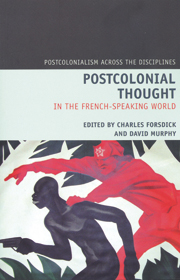Book contents
- Frontmatter
- Contents
- Acknowledgements
- Introduction: Situating Francophone Postcolonial Thought
- Section 1 Twelve Key Thinkers
- 1 Aimé Césaire and Francophone Postcolonial Thought
- 2 Maryse Condé: Post-Postcolonial?
- 3 Jacques Derrida: Colonialism, Philosophy and Autobiography
- 4 Assia Djebar: ‘Fiction as a way of “thinking”’
- 5 Frantz Fanon: Colonialism and Violence
- 6 Édouard Glissant: Dealing in Globality
- 7 Tangled History and Photographic (In)Visibility: Ho Chi Minh on the Edge of French Political Culture
- 8 Translating Plurality: Abdelkébir Khatibi and Postcolonial Writing in French from the Maghreb
- 9 Albert Memmi: The Conflict of Legacies
- 10 V. Y. Mudimbe's ‘Long Nineteenth Century’
- 11 Roads to Freedom: Jean-Paul Sartre and Anti-colonialism
- 12 Léopold Sédar Senghor: Race, Language, Empire
- Section 2 Themes, Approaches, Theories
- Notes on Contributors
- Bibliography
- Index
6 - Édouard Glissant: Dealing in Globality
from Section 1 - Twelve Key Thinkers
- Frontmatter
- Contents
- Acknowledgements
- Introduction: Situating Francophone Postcolonial Thought
- Section 1 Twelve Key Thinkers
- 1 Aimé Césaire and Francophone Postcolonial Thought
- 2 Maryse Condé: Post-Postcolonial?
- 3 Jacques Derrida: Colonialism, Philosophy and Autobiography
- 4 Assia Djebar: ‘Fiction as a way of “thinking”’
- 5 Frantz Fanon: Colonialism and Violence
- 6 Édouard Glissant: Dealing in Globality
- 7 Tangled History and Photographic (In)Visibility: Ho Chi Minh on the Edge of French Political Culture
- 8 Translating Plurality: Abdelkébir Khatibi and Postcolonial Writing in French from the Maghreb
- 9 Albert Memmi: The Conflict of Legacies
- 10 V. Y. Mudimbe's ‘Long Nineteenth Century’
- 11 Roads to Freedom: Jean-Paul Sartre and Anti-colonialism
- 12 Léopold Sédar Senghor: Race, Language, Empire
- Section 2 Themes, Approaches, Theories
- Notes on Contributors
- Bibliography
- Index
Summary
It is over half a century now since Martinique's Édouard Glissant arrived on the literary scene in Paris, publishing his first volumes of poetry in the early 1950s, and his first novel, La Lézarde, in 1958. Since that time he has produced eight stylistically demanding novels (the latest being Ormerod in 2003), a good many collections of poetry, and one influential play about the Haitian Revolution. Arguably, though, it is not as a novelist or poet that Glissant has proved most influential at the international level, but as a theorist. With his unflagging advocacy of a creolizing world of Diversity and Relation, he has become one of the few French-language writers, after Césaire and Fanon, to have made a major impact on postcolonial theory in the Anglo-American academy. No less a luminary than Gayatri Spivak has, for instance, stressed her ‘affinity with Glissant's thinking’ (2006, 108), championing his vision of ‘creolity’ on the grounds that it ‘assumes imperfection, even as it assures the survival of a rough future’ (109). In the first half of this chapter I provide an overview of this vision, basing my account on his recent collection of essays, La Cohée du Lamentin (2005). In the second half, by contrast, I adopt a diachronic approach, arguing that notwithstanding the remarkable consistency of Glissant's vision over the past five decades when it comes to ‘creolity’, his later work is characterized by a turn away from the political and its necessarily partisan commitments.
- Type
- Chapter
- Information
- Postcolonial Thought in the French Speaking World , pp. 90 - 101Publisher: Liverpool University PressPrint publication year: 2009

